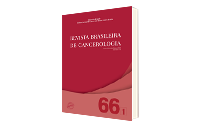In vitro Studies of Antitumor Activity of Vanadium Complexes with Orotic and Glutamic Acids
DOI:
https://doi.org/10.32635/2176-9745.RBC.2020v66n1.649Keywords:
Carcinoma, Hepatocellular, Vanadium Compounds, Drug Screening Assays, AntitumorAbstract
Introduction: Three vanadium complexes with orotic and glutamic acids, in their anion forms, were prepared and their in vitro cytotoxicity toward human lung fibroblasts (MRC-5), human hepatocellular carcinoma (HepG2) and human colorectal adenocarcinoma (Caco-2) are reported. Objective: Describe the synthesis and characterization of new vanadium complexes with orotic and glutamic acids, and test its antitumor activity against HepG2 and Caco-2. Method: The complexes were formulated as VO (oro), VO (α-glu) and VO (γ-glu) based on chemical, thermogravimetric analyses and infrared spectra. Results: Resazurin assay demonstrates its cytotoxicity against the HepG2 and Caco-2 cell lines with the IC50 ranging from 7.90 to 44.56 μmol.L-1. The cytotoxicity profiles indicate that the tumoral lines show more activity than the cells MRC-5, with selectivity indexes ranging from 1.58 to 8.96. Conclusion: The three complexes had better in vitro activity than cisplatin for both normal and cancer cell lines. The IC50 values are two to six times better for the cancer cell lines and five to seven times better for the normal cell lines. This study indicates that the complexes obtained are promising candidates for antitumor drugs.
Downloads
Downloads
Published
How to Cite
Issue
Section
License
Os direitos morais e intelectuais dos artigos pertencem aos respectivos autores, que concedem à RBC o direito de publicação.

This work is licensed under a Creative Commons Attribution 4.0 International License.









